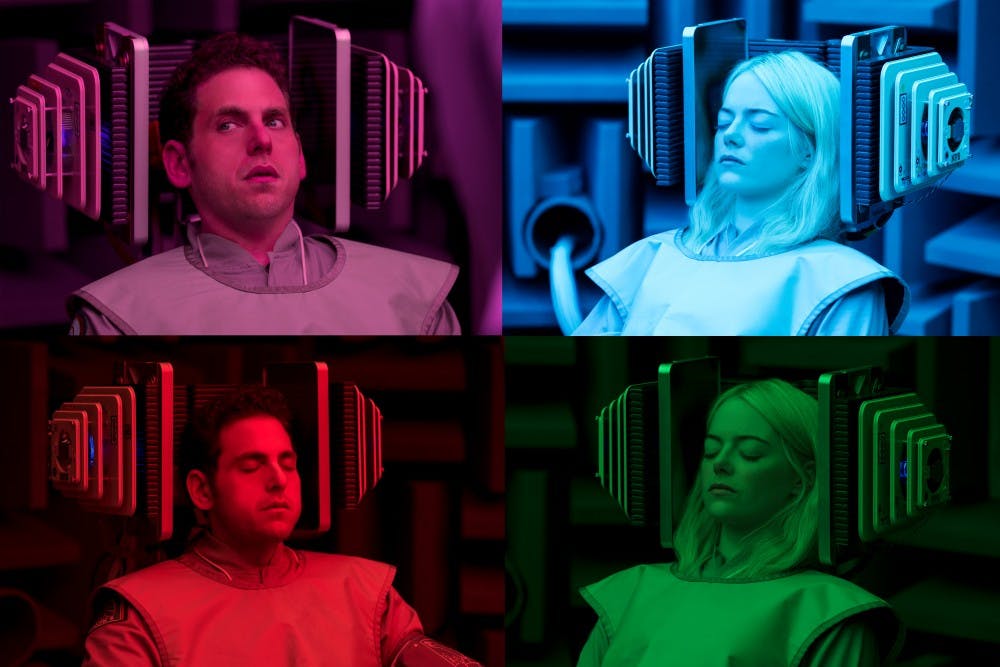A gorgeous, radiant chronicle of the many connections that created the universe grace the opening moments of Maniac, showcasing the masterful direction and ambitious scope of Netflix’s latest limited series. A well–produced, high–budget series like this one is a welcome return to form for the streaming giant. Maniac tackles the issue of human connection in today’s world, earning itself a place on everyone’s fall TV must–watch list.
A New York ravaged by late–stage capitalism sets the show’s tone and serves as its backdrop. Diminutive Roomba–esque robots wander the streets, cigarettes and green computer screens are ubiquitous, and people sign up for dangerous drug trials to earn a quick buck. Corporations are everywhere and know the most intimate details of their customers’ lives.

And yet, intimacy and connection is in short supply. Some companies sell hired friends to the lonely, and others ask single men to become volunteer husbands to help mend broken families. Friends are disinterested in each other’s lives, and conversations sputter and die from suffocation.
Perched at the end of a table in a boardroom, the viewer is introduced to Owen Milgram (Jonah Hill) as he answers the questions of his father’s lawyers. Owen Milgram is the epitome of New York’s alienation. A diagnosed schizophrenic, Owen is the black sheep of the wealthy Milgram clan. Called upon by his kin to defend his brother from sexual assault allegations, Owen is unwillingly drawn into the center of his family’s politics when he wants nothing more than to escape the city and live out in the country. Adamantly independent, Owen refuses the handouts of his father–in–law, relying on his own meager income until he loses his job. Desperate, Owen enlists in a dangerous drug trial to make ends meet.
Annie (Emma Stone) is just as desperate as Owen. Addicted to Neberdine’s experimental and exceedingly dangerous drug “A,” she puts off a trip to see her estranged sister to strong–arm her way onto the same drug trial as Owen.
Both on the run from their respective family situations, Owen and Annie are twin peaks of alienation on New York’s isle of loneliness. But Maniac isn't afraid to sprinkle in some dark humor. Owen’s only confidant is his imaginary brother, who occasionally appears to peddle conspiracy theories and to assure him that one day he will save the world.

Annie, of course, has no one except a bottle of pills and her deadbeat dad, who lives in an iron–lung like machine and refuses to see the light of day. Owen is excluded from the family portrait, with a small picture frame of his face added next to it like an almost–forgotten addendum. Annie is perpetually cast out by the people around her, with a security guard shooing her away from a pile of trash and a clerk questioning her ability to pay for cigarettes.
In essence, what director Cary Fukunaga has created is a funhouse mirror of our world, stretching its edges so as to show us its fault lines. Without the appearance of a single smartphone, Maniac captures perfectly the simultaneous connectivity and isolation that go hand–in–hand in a world dominated by social media. Owen and Annie are scarcely alone for a minute before being interrupted by some telephone call or unwanted conversation and yet they cannot help but feel the all–too–familiar ache for human connection and intimacy.
The show declares in its opening monologue, “Hypothesis: all souls are on a quest to connect. Corollary: our minds have no awareness of this quest.” It is with this hypothesis that the show occupies itself throughout its ten–episode run, and it is with this hypothesis that we occupy ourselves with as students on a college campus. Maniac is the perfect show for those looking for validation in the tempestuous, isolating world of university life.







